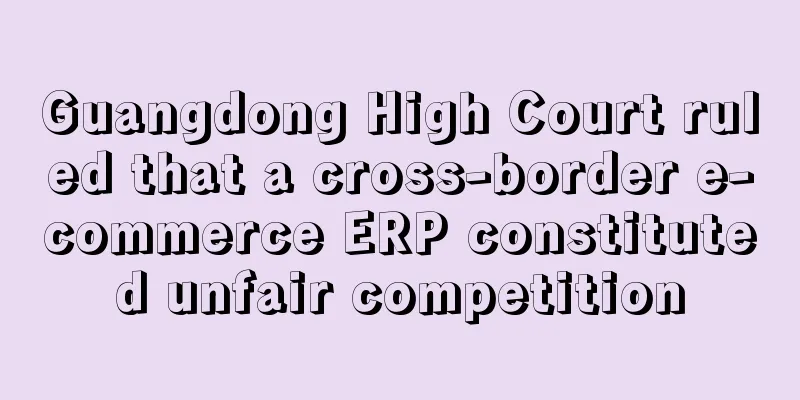Guangdong High Court ruled that a cross-border e-commerce ERP constituted unfair competition

|
The " 2024 China Cross-border E-commerce Software Service Industry Report" shows that the scale of China's cross-border e-commerce market has jumped from US$0.7 trillion in 2019 to US$1.4 trillion in 2023, and is expected to exceed US$2.4 trillion in 2028.
However, as the industry develops rapidly, some SaaS service providers have also exposed the phenomenon of disordered competition - from functional architecture to interactive design, some companies have excessively borrowed and "copied homework", which also raises new issues for the long-term healthy development of the industry.
In June 2024, the Shenzhen Intermediate People's Court made a second-instance judgment, finding that Shenzhen Dianxiaomi Network Technology Co., Ltd. and Shenzhen Meiyunji Network Technology Co., Ltd. (its product "Saihu ERP") constituted unfair competition. The case originated from Shenzhen Lingxing Network Technology Co., Ltd. (its product "Lingxing ERP") claiming that Meiyunji had committed software interface plagiarism and infringement, and then filed a lawsuit with the Longgang District People's Court of Shenzhen.
After the Shenzhen Intermediate People's Court made the second-instance judgment, Meiyunji Company and Dianxiaomi Company applied for a retrial to the Guangdong Higher People's Court. After review, the Guangdong Higher People's Court made the "(2024) Yue Min Shen No. 13348" civil ruling on January 15, 2025, rejecting the retrial application of Meiyunji Company and Dianxiaomi Company, and held that the second-instance court's determination that Meiyunji Company and Dianxiaomi Company constituted unfair competition was not improper. The following is part of the original text of the ruling: "...... This court believes that the software interface is the "outer shell" of the software product, and the two are in the relationship of content and form. The higher the popularity of the software product, the more users of the software interface, and the higher the popularity of the software interface. Therefore, the popularity of the software product can prove the popularity of the software interface. In this case, first of all, the tax report, award certificate, publicity contract and payment voucher, sales revenue and other evidence submitted by Lingxing Company are sufficient to prove the popularity of Lingxing ERP software, and then prove the popularity of the software interface. ......"
This ruling means that the Shenzhen Intermediate People's Court and the Guangdong High People's Court have both determined that the defendants in this case, Meiyunji Company and Dianxiaomi Company, used the Lingxing ERP software interface similar to that of Lingxing Company without the permission of Lingxing Company, which constituted unfair competition. The judgment has final legal effect.
According to the "2024 China Cross-border E-commerce Software Service Industry Report" released by iResearch Consulting, Lingxing ERP ranks first in the market share of multi-platform cross-border e-commerce ERP, mainly Amazon. As a typical practice case of unfair competition caused by SaaS software interface, this case provides a reusable litigation path reference for solving the two major judicial dilemmas of "difficulty in identifying substantial similarity" and "difficulty in obtaining source code evidence" in the software industry, and also brings important significance to the healthy development of the cross-border e-commerce industry.
As the cross-border e-commerce industry involves cross-regulation by multiple national legal systems, the compliance risks of cross-border enterprises have attracted the attention of more and more sellers in recent years. The judicial practice of this case is not only of great reference value to similar cases of SaaS software interface protection at the level of innovation protection, but also of great reference value to the construction of a three-dimensional (innovation capability, compliance history, and risk control mechanism) compliance assessment system for cross-border e-commerce enterprises in the selection of service providers at the level of enterprise compliance system construction. Leading Star ERP Fox Racing |
<<: Amazon's top sellers: It is recommended to "increase the intensity" for Chinese sellers
>>: The battle with Temu is expanding again! Is Amazon Haul going to Europe?
Recommend
What is Kingdee Guanyi Cloud? Kingdee Guanyi Cloud Review, Features
Kingdee Guanyi Cloud is a subsidiary of Kingdee Gr...
The export e-commerce market size in the first half of the year was 5.5 trillion yuan and is expected to exceed 12 trillion yuan for the whole year
On August 29, the E-Commerce Research Center of t...
What is Diffshop? Diffshop Review, Features
<span data-docs-delta="[[20,{"gallery"...
Will Black Friday be a flop this year? A group of sellers are pessimistic about the peak season
Black Friday kicks off, and cross-border sellers ...
Best things for everything, Google launches new micro shopping site
According to Mashable, search engine giant Google...
What is Hongyi Overseas Warehouse? Hongyi Overseas Warehouse Review, Features
Shenzhen Hongyi Cross-border E-commerce Service Co...
What is Nepal Rastra Bank (NRB)? Nepal Rastra Bank (NRB) Review, Features
<span data-docs-delta="[[20,{"gallery"...
What is Leesa? Leesa Review, Features
Founded in 2014, Leesa is a luxury mattress e-com...
UK online retail sales fall 4.7% in June
Recently, the UK Office for National Statistics (...
The stock price has plummeted by 80%. Is Lazada going out of fashion?
Google Finance shows that the closing price of Li...
Cross-border live streaming is popular: 700,000 "foreign bosses" watched the live broadcast of Chinese factories on Alibaba International Station
There is no hawking or shouting, just relying on ...
What is Tapuya Brands? Tapuya Brands Review, Features
Tapuya Brands is from the United States and focuse...
A new type of "account blocking behavior"? A group of sellers were caught
Troubled times! Every peak season will see a larg...
Home Depot opens new distribution center to increase delivery capabilities
With the surge in online shopping in the United S...
Amazon's hot-selling season is coming, these hot-selling products should be prepared
As we all know, there were almost no grand holida...









